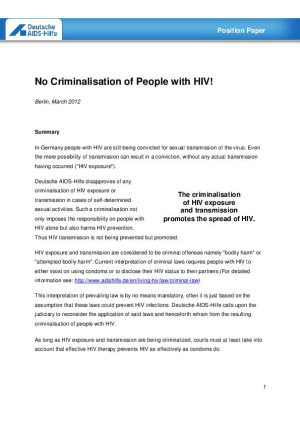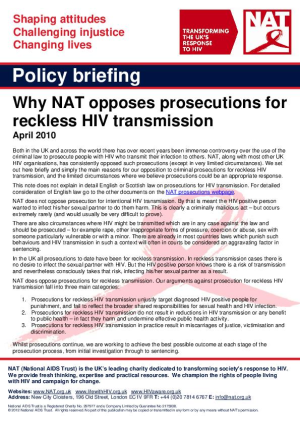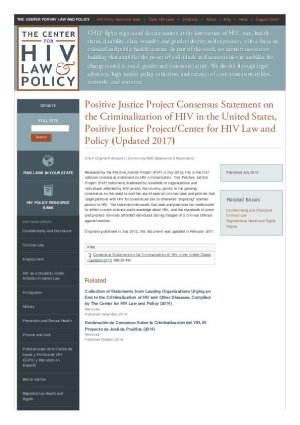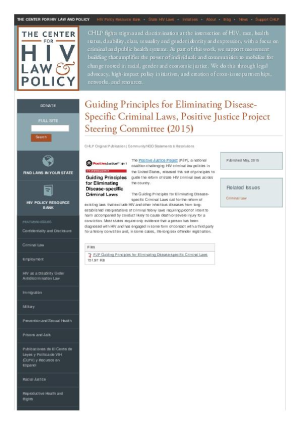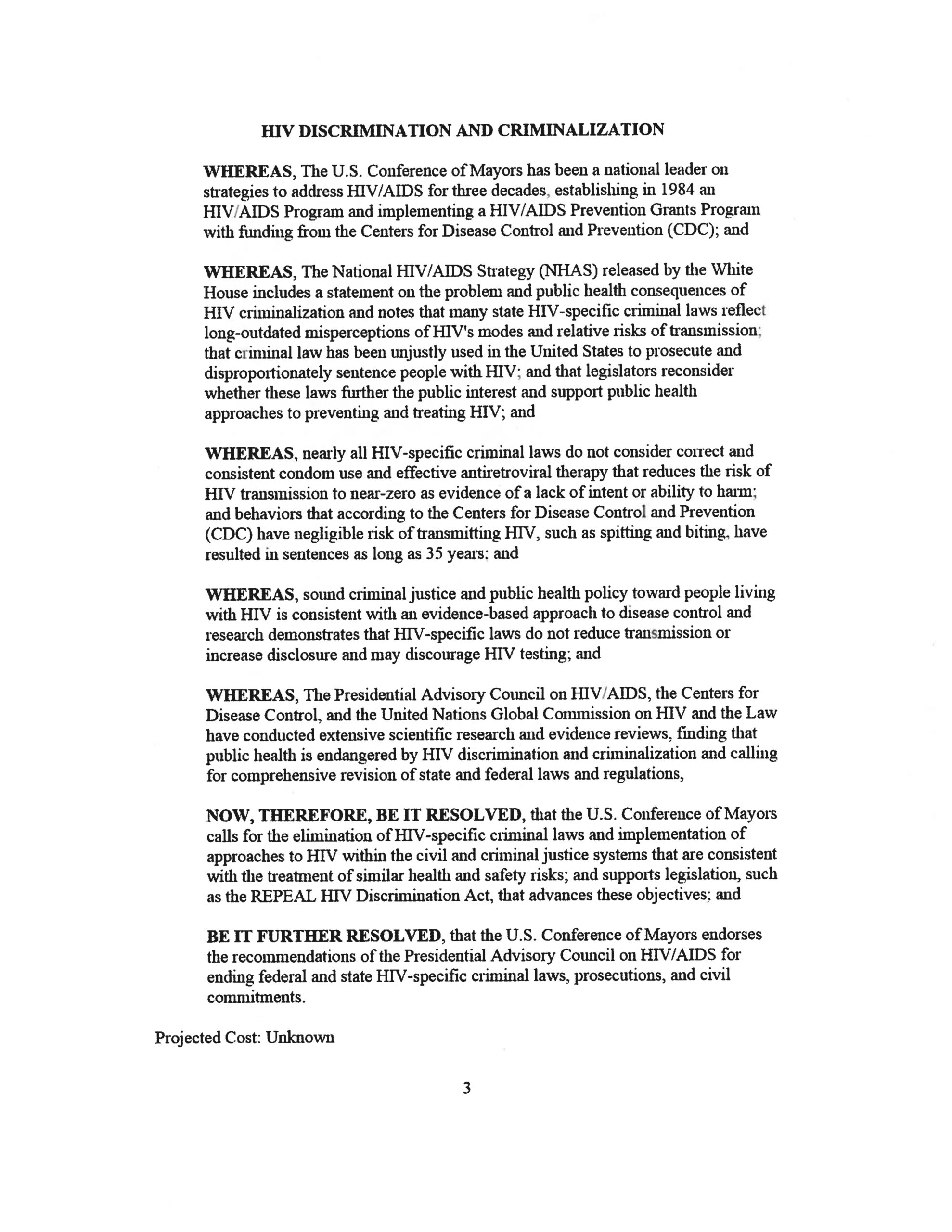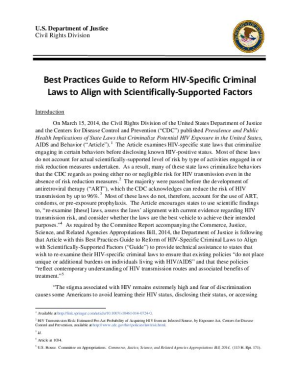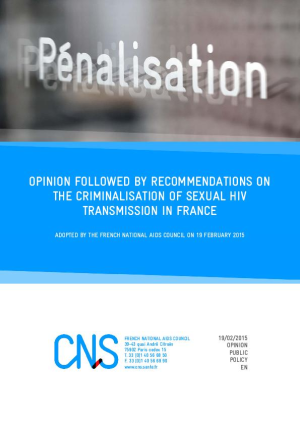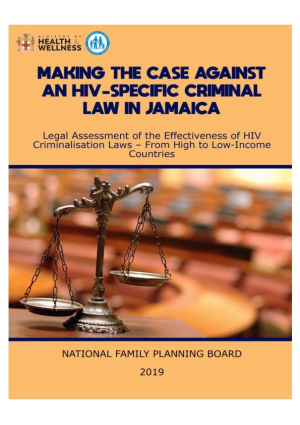Argues that criminalisation undermines HIV prevention efforts, calls for a clear distinction between moral and legal issues, and calls on the judiciary to reconsider the application of criminalisation against people with HIV.
What the experts say
National policy organisations
In some jurisdictions, HIV law and policy organisations have joined calls for review of existing laws and their use against people with HIV. Their efforts have included practical steps, for example, development of guiding principles and best practice guidance.
Why NAT opposes prosecutions for reckless HIV transmission
Explains the main reasons the National AIDS Trust opposes criminal prosecutions for reckless HIV transmission, and the limited circumstances where prosecutions may be an appropriate response.
Consensus Statement on The Criminalization Of HIV in the United States
The first national consensus statement by (a long list of) U.S. community organisations and individuals, released by the Positive Justice Project in July 2012. The Consensus Statement includes calls for an end to the use of specific laws and to prosecutions where there is no intent to cause harm and current science does not support the likelihood of transmission.
- Alternative links
- Spanish
Resolution of the Board of Directors of the National Association of Criminal Defense Lawyers Concerning HIV Criminalization
Opposes laws that base criminal liability and/or penalty on HIV status, rather than intent to harm. Argues that focus on knowledge of status as a key element of an HIV-related crime rather than intent and capacity to transmit the virus, is a classic example of an inadequate mens rea (or criminal intent) requirement and overly expansive criminalization.
Guiding Principles for Eliminating Disease-Specific Criminal Laws
This 2015 document from Positive Justice Project Steering Committee outlines their guiding principles for modernising or repealing HIV-specific criminal laws.
Resolution on Ending Federal and State HIV-Specific Criminal Laws, Prosecutions, and Civil Commitments
Calls for federal action to address criminalisation including review of laws and cases.
Resolution on HIV Discrimination and Criminalization
Calls for the elimination of HIV-specific criminal laws and implementation of approaches to HIV consistent with the treatment of similar health and safety risks. Endorses the recommendations of the Presidential Advisory Council on HIV/AIDS for ending federal and state HIV-specific criminal laws, prosecutions, and civil commitments.
Best Practices Guide to Reform HIV-Specific Criminal Laws to Align with Scientifically-Supported Factors
Provides technical assistance to states wanting to re-examine HIV-specific criminal laws to ensure that existing policies “do not place unique or additional burdens on individuals living with HIV/AIDS” and that policies “reflect contemporary understanding of HIV transmission routes and associated benefits of treatment.”
Opinion followed by recommendations on the criminalisation of the sexual transmission of HIV in France
Presents an assessment of the legal, ethical, societal and health issues raised by criminal proceedings brought in France for acts of transmission or exposure to the risk of sexual transmission of HIV.
What is the Consensus Statement on HIV “Treatment as Prevention” in Criminal Law Reform?
The Consensus Statement is a collaborative document that grew out of the recognition of a need for guidance on how the science of HIV treatment and prevention tools relates to the reform of HIV criminal laws.
End unjust HIV criminalisation – Community Statement
The Community Consensus Statement outlines a shared critique of why Canada’s approach to HIV criminalization is wrong and calls for some specific actions that federal, provincial and territorial governments should take to end unjust criminal prosecutions against people living with HIV. It was developed by the CCHRC to be a common set of demands by those organizations who sign on to it.
Making the case against an HIV-specific law in Jamaica
This assessment ‘Legal Assessment of the Effectiveness of HIV Criminalisation Laws-from High to Low-Income Countries’ demonstrates why the enactment of an HIV-specific criminal law in Jamaica would be harmful to the national HIV response. It sets out the bases on which the recommendation for an HIV-specific criminal law should be rejected and highlights the need for public health policy considerations to centre the discussions surrounding HIV criminalisation in Jamaica.

